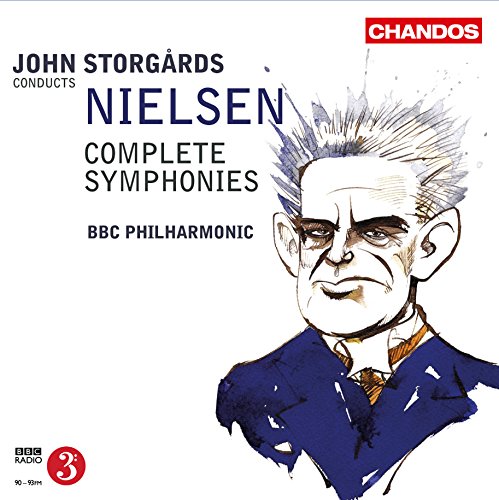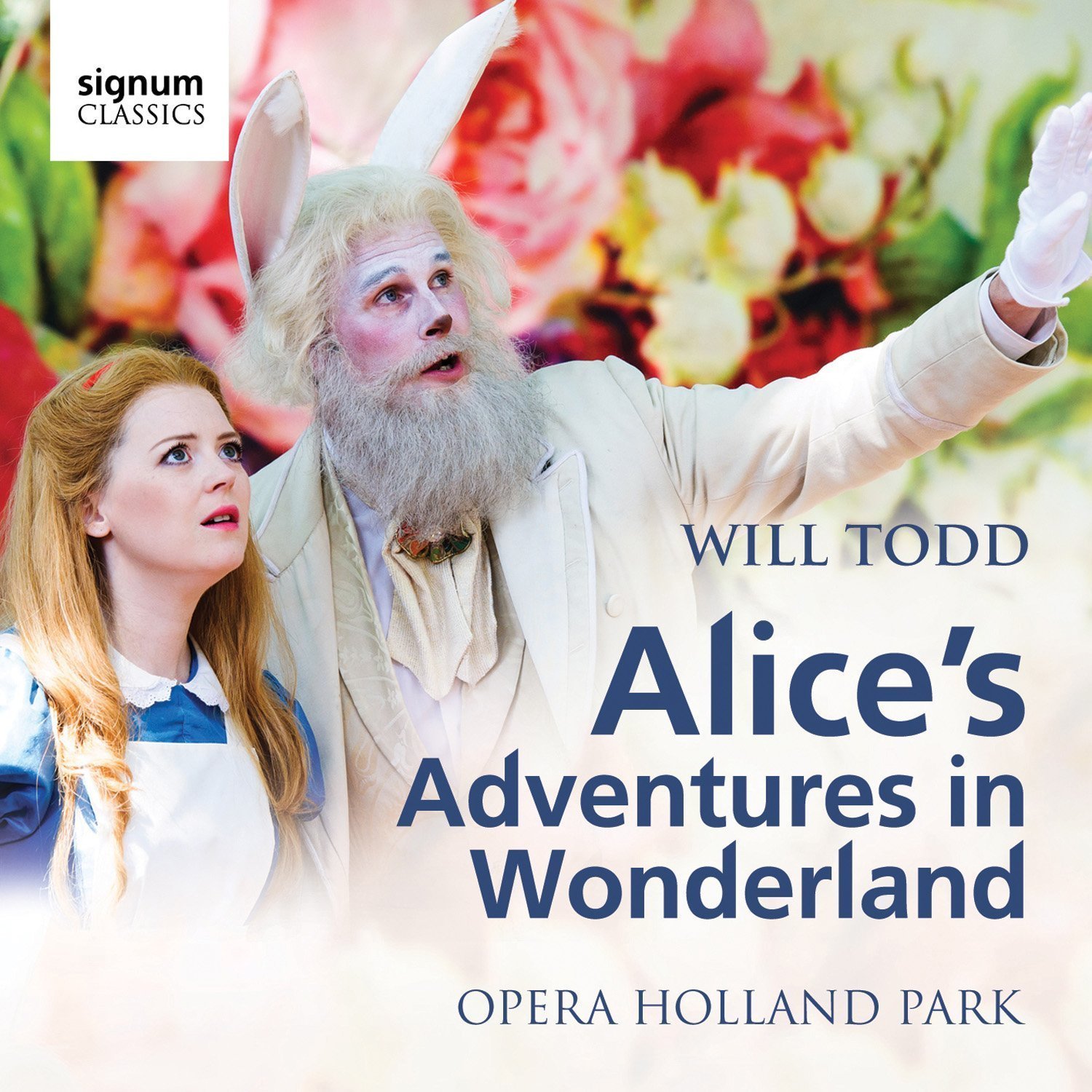Classical CDs Weekly: Nielsen, Terry Riley, Will Todd | reviews, news & interviews
Classical CDs Weekly: Nielsen, Terry Riley, Will Todd
Classical CDs Weekly: Nielsen, Terry Riley, Will Todd
Danish symphonies, American piano duets and an approachable contemporary opera


Nielsen: Complete Symphonies BBC Philharmonic/John Storgårds (Chandos)
Recently completed Nielsen cycles by Alan Gilbert and Sakari Oramo have been released on separate discs. Chandos have issued John Storgårds’ new cycle in a single mid-price package. So it’s possible to spend a satisfying few hours working chronologically through the sequence, noting the thematic links, the stylistic tics which make this composer’s music so compelling. Oscillating semiquavers in woodwinds are a recurring feature, and Nielsen’s knack of writing neat fugues was present from the start. As with recorded cycles of Sibelius and Mahler symphonies, it’s rare to find a conductor who gets them all right. Storgårds is at his best in nos. 5 and 6. The contrapuntal lines are never muddy. Paul Patrick’s side drum solo in No. 5 is excellent, and the ghostly first movement coda is wonderful. Maybe the second movement’s swinging main theme could be a little faster, but Storgårds draws the disparate elements together effectively and the symphony’s heroic close blazes. No. 6 is better still – the BBC Philharmonic coping heroically with Nielsen’s angular counterpoint. Trombone glissandi are magnificently sleazy, and the “Proposta seria” is affecting. The symphony’s end is as disconcerting as it should be, with David Fanning’s extended sleeve note suggesting that the bassoon pedal is the sound of Nielsen giving death the finger.
Things aren’t always as successful in the earlier symphonies. Nos. 1 and 2 seem a little under-characterised; the former’s speeds are occasionally cautious and No. 2’s extremes of mood feel muted. No. 3 does warm up after an uninvolving start – how good to hear those flutter-tongued trumpets before the first movement’s waltz. Gillian Keith and Mark Stone excel in the “Andante Pastorale”. No. 4 could do with a bit more weight and wildness; Gilbert and Oramo show how overwhelming this work should be. If you know and love these symphonies you’ll want this 3-disc box despite my reservations: Chandos’s sound is typically impressive, and the orchestral playing doesn’t disappoint. Not sure about the cover art though: Neale Osborne’s disquieting caricature makes Nielsen look uncharacteristically grumpy.
 ZOFO Plays Terry Riley (Sono Luminus)
ZOFO Plays Terry Riley (Sono Luminus)
Pioneering Minimalist Terry Riley turned 80 in June. He’s most famous for In C, an iconic 1964 work built around 53 short melodic phrases which can be performed and repeated at will. Steve Reich took part in the first performance. Pounding semiquaver Cs are the constant, but each performance is unique, as browsing through performances on Youtube will demonstrate. This scintillating disc collects Riley’s output for piano duet, plus a handful of transcriptions. Riley’s fastidiousness and shrewd organisation will surprise anyone who’s only heard In C. These pieces fizz with intelligence. The breezy opening of Jaztine is typical, its insistent rhythms supporting fiendishly complex writing in the upper octaves. The recent Praying Mantis Rag is one of the catchiest things I’ve heard all year.
Riley also compels in more introspective mood. Etude from the OId Country has a bluesy, smoky opening before the tempo hots up, and there’s a similarly alluring passage at the heart of Jaztine. Special effects are all the more powerful for being used sparingly, as with the prepared piano sounds at the heart of Cinco de Mayo. Two pieces originally commissioned by the Kronos Quartet sound thoroughly idiomatic in their new colours, G Song’s irresistible forward motion coming to an unexpectedly abrupt halt. Simone’s Lullaby was originally a two-handed piece, but it’s impeccably refined and deeply affecting in duet form. ZOFO’s performances are flawless – Riley is quoted on the booklet: “They think and play as if guided by a universal mind.” Demonstration quality sound, as you’d expect from this source, and a bonus Blu-ray audio disc for the technologically gifted. Unmissable.
 Will Todd: Alice’s Adventures in Wonderland Opera Holland Park (Signum)
Will Todd: Alice’s Adventures in Wonderland Opera Holland Park (Signum)
Taking young children to "family" operas is a risky business. You may leave the performance buzzing, while the high your charges may be experiencing is probably due to the sweets they’ve ingested during the show. Wordy libretti and flat direction can kybosh the best of intentions, so it’s good to report that Will Todd’s new Alice opera, commissioned by Opera Holland Park, entertains even when shorn of its visuals. Maggie Gottlieb’s text manages to construct a coherent narrative from Carroll’s two books, though opening with James Cleverton’s White Rabbit being released by Fflur Wyn’s Alice from a cage in a pet shop. Carroll’s Drink Me bottle becomes an athletic soprano (Maud Millar). Keel Watson’s Caterpillar sings a growly blues number. A villainous Queen of Hearts is sung by a splendidly sardonic Robert Burt.
Todd’s 11-piece pit band is dominated by brass and wind, something necessitated by the opera’s al fresco staging. Which is why we get witty, accordion-led numbers sung by a quartet of Victorians whose job it was to lead the audience from scene to scene while the musicians upped sticks and relocated. Musically it’s all highly approachable – Todd’s penchant for brassy jazziness rarely jars, and there’s a magical wooziness to some of the softer episodes. No libretto is provided, but the cast sing with impeccable diction, the players never drowning out the voices. Can we have a DVD please?
Explore topics
Share this article
The future of Arts Journalism
You can stop theartsdesk.com closing!
We urgently need financing to survive. Our fundraising drive has thus far raised £49,000 but we need to reach £100,000 or we will be forced to close. Please contribute here: https://gofund.me/c3f6033d
And if you can forward this information to anyone who might assist, we’d be grateful.

Subscribe to theartsdesk.com
Thank you for continuing to read our work on theartsdesk.com. For unlimited access to every article in its entirety, including our archive of more than 15,000 pieces, we're asking for £5 per month or £40 per year. We feel it's a very good deal, and hope you do too.
To take a subscription now simply click here.
And if you're looking for that extra gift for a friend or family member, why not treat them to a theartsdesk.com gift subscription?
more Classical music
 Hallé John Adams festival, Bridgewater Hall / RNCM, Manchester review - standing ovations for today's music
From 1980 to 2025 with the West Coast’s pied piper and his eager following
Hallé John Adams festival, Bridgewater Hall / RNCM, Manchester review - standing ovations for today's music
From 1980 to 2025 with the West Coast’s pied piper and his eager following
 Kaploukhii, Greenwich Chamber Orchestra, Cutts, St James's Piccadilly review - promising young pianist
A robust and assertive Beethoven concerto suggests a player to follow
Kaploukhii, Greenwich Chamber Orchestra, Cutts, St James's Piccadilly review - promising young pianist
A robust and assertive Beethoven concerto suggests a player to follow
 Robin Holloway: Music's Odyssey review - lessons in composition
Broad and idiosyncratic survey of classical music is insightful but slightly indigestible
Robin Holloway: Music's Odyssey review - lessons in composition
Broad and idiosyncratic survey of classical music is insightful but slightly indigestible
 Classical CDs: Wolf-pelts, clowns and social realism
British ballet scores, 19th century cello works and contemporary piano etudes
Classical CDs: Wolf-pelts, clowns and social realism
British ballet scores, 19th century cello works and contemporary piano etudes
 Bizet in 150th anniversary year: rich and rare French offerings from Palazzetto Bru Zane
Specialists in French romantic music unveil a treasure trove both live and on disc
Bizet in 150th anniversary year: rich and rare French offerings from Palazzetto Bru Zane
Specialists in French romantic music unveil a treasure trove both live and on disc
 Scottish Chamber Orchestra, Ibragimova, Queen’s Hall, Edinburgh review - rarities, novelties and drumrolls
A pity the SCO didn't pick a better showcase for a shining guest artist
Scottish Chamber Orchestra, Ibragimova, Queen’s Hall, Edinburgh review - rarities, novelties and drumrolls
A pity the SCO didn't pick a better showcase for a shining guest artist
 Kilsby, Parkes, Sinfonia of London, Wilson, Barbican review - string things zing and sing in expert hands
British masterpieces for strings plus other-worldly tenor and horn - and a muscular rarity
Kilsby, Parkes, Sinfonia of London, Wilson, Barbican review - string things zing and sing in expert hands
British masterpieces for strings plus other-worldly tenor and horn - and a muscular rarity
 From Historical to Hip-Hop, Classically Black Music Festival, Kings Place review - a cluster of impressive stars for the future
From quasi-Mozartian elegance to the gritty humour of a kitchen inspection
From Historical to Hip-Hop, Classically Black Music Festival, Kings Place review - a cluster of impressive stars for the future
From quasi-Mozartian elegance to the gritty humour of a kitchen inspection
 Shibe, LSO, Adès, Barbican review - gaudy and glorious new music alongside serene Sibelius
Adès’s passion makes persuasive case for the music he loves, both new and old
Shibe, LSO, Adès, Barbican review - gaudy and glorious new music alongside serene Sibelius
Adès’s passion makes persuasive case for the music he loves, both new and old
 Anja Mittermüller, Richard Fu, Wigmore Hall review - a glorious hall debut
The Austrian mezzo shines - at the age of 22
Anja Mittermüller, Richard Fu, Wigmore Hall review - a glorious hall debut
The Austrian mezzo shines - at the age of 22
 First Person: clarinettist Oliver Pashley on the new horizons of The Hermes Experiment's latest album
Compositions by members of this unusual quartet feature for the first time
First Person: clarinettist Oliver Pashley on the new horizons of The Hermes Experiment's latest album
Compositions by members of this unusual quartet feature for the first time

Add comment